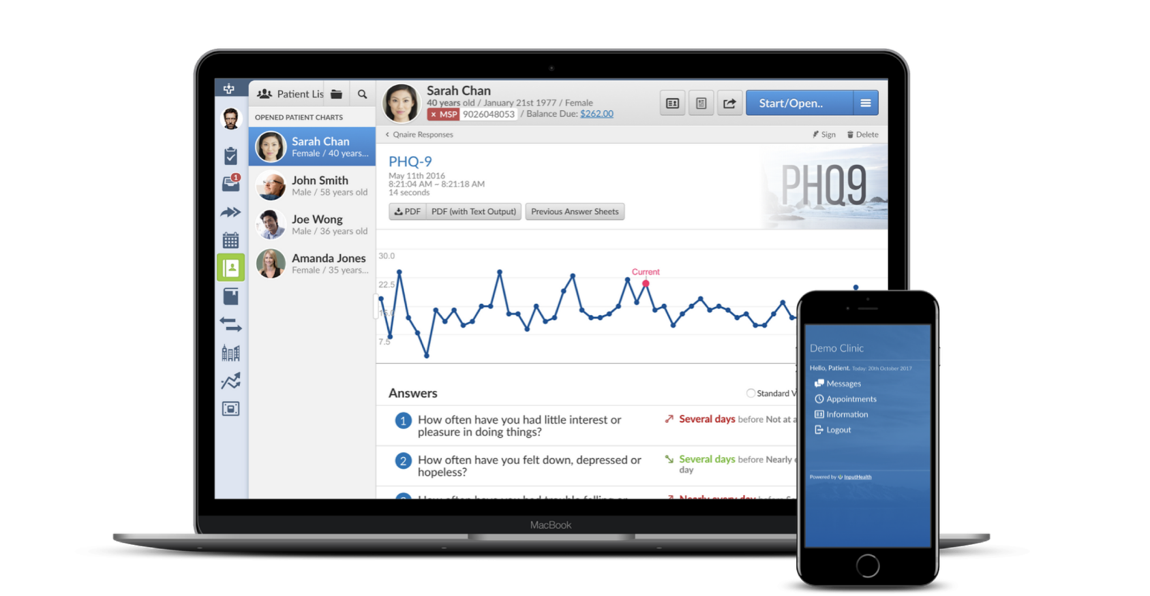These tools can help you have meaningful conversations with patients about mental health

The conversation around mental health has grown louder than ever in recent years. From prominent figures and celebrities to employees in the workplace, many people have become increasingly comfortable speaking up about their mental health challenges. In fact, a 2021 Ipsos poll found that 53% of Canadians are willing to discuss mental health issues with family, health professionals, or on social media, up from 41% in 2018.
But even so, many Canadians aren’t getting the specialized care they need: nearly 44% of those who required mental health support said their needs were either unmet or only partially met. What’s more, struggles with mental health prevent approximately 500,000 Canadians from attending work every week. And the COVID-19 pandemic has only exacerbated these challenges, intensifying stress and anxiety for countless Canadians.
The result? We’ve seen a surge in the demand for mental health support — and also in the adoption and delivery of virtual mental health services. Thanks to the convenience and comfort it provides, many Canadians have had positive experiences with virtual care. A TELUS Health survey found that 32% of respondents would like to receive health care services virtually in the future, while 29% say they are flexible.[1]
As mental health challenges continue to affect the lives of Canadians, virtual care and other digital health tools can play a powerful role in meeting the growing demand for support. In particular, these tools have the potential to help physicians, specialists, and other healthcare providers have more meaningful conversations with patients about their mental health.
Pre-appointment questionnaires provide invaluable patient information.
There’s no denying that physicians face extraordinary demands on their time, and that’s exactly where pre-appointment questionnaires can help. By learning important information about a patient’s mental health in advance, physicians may be able to have more efficient appointments.
One of the most prevalent questionnaires — the Patient Health Questionnaire-9 (PHQ-9) — consists of nine items designed to screen for depression in primary care and other medical settings. Questionnaires like these are simple for physicians to implement as they can be sent automatically before appointments or at recurring intervals between appointments. This makes them useful for both diagnosis and monitoring over time. They also allow physicians to drill down to specific functional areas; for example, the PHQ-9 is relevant to sleep. Studies have also shown that these questionnaires have high sensitivity, accurately identifying patients in need of further assessment.

When offered through electronic medical records (EMRs) and virtual care tools, such as the TELUS Health Collaborative Health Record, pre-appointment questionnaires can be especially useful. In addition to helping physicians save time on documentation by attaching patient responses directly to their record, these tools make it easier for patients to communicate with their doctors and actively participate in their health journey.
Digital solutions can empower patients to follow their treatment plan.
Patient engagement, which can take a variety of forms — from embracing lifestyle changes to using an encrypted messaging portal to ask questions about their treatment — plays a vital role in mental health care.
Patient portals, Home Health Monitoring, and other digital tools like the Collaborative Health Record help simplify and streamline the process of engaging with healthcare providers. This can help translate into better mental health care, as patients are more likely to share accurate, honest information when they feel engaged with their healthcare team. Moreover, quick and intuitive access to more complete patient information can help enhance how physicians deliver care.
Encounter notes and dashboards can help enhance mental health appointments.
Other important digital tools that physicians can use to elevate conversations around mental health include encounter notes and dashboards, both of which support the continuity of mental health care.
Tools like the TELUS Health EMR Virtual Visit and Collaborative Health Record organize and display patient information in a user-friendly way, making it easy to see patient history at a glance, monitor trends, and more. This allows physicians to streamline appointments and spend more time focusing on delivering care. Physicians can also more readily see what conversations and outcomes patients have had and tailor upcoming appointments accordingly, helping ensure they get the most out of their time together. In addition, this information can help doctors evaluate the efficacy of treatment programs by aggregating outcomes across a population of patients using dashboards within the Collaborative Health Record.
Bringing mental health out of the shadows.
Soaring numbers of Canadians have struggled with their mental health in recent years, but the encouraging news is that people are increasingly willing to speak up. Considering the fact that almost 80% of the population now relies on their family physician to meet their mental health needs, it’s more important than ever for physicians to talk to patients about their mental health.
Technologies are playing a key role in facilitating that. By harnessing the power of digital health solutions, physicians can have meaningful conversations and help improve the lives of those with mental health conditions.
Learn more about the novel ways that TELUS Health is helping physicians care for their patients’ mental health, and the role mental health apps play in connecting more Canadians with the care they need.
[1] Ad Hoc Research. TELUS Healthcare Centres Mental Health Clinics Primary Research. Montréal, QC: TELUS Health; 2021; page 29
